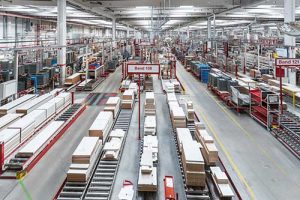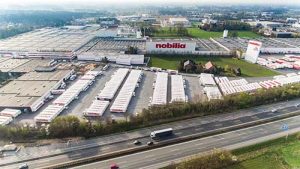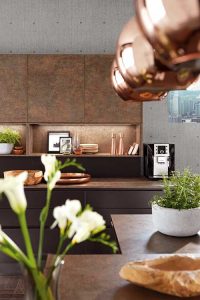‘They call it The Beast’
Growth in the UK retail market may not have always been a priority for German kitchen giant Nobilia but, with the brand set to appear for the first time ever at kbb Birmingham next month and amid ongoing investments in its UK sales force, that’s all about to change. Rebecca Nottingham reports
It’s only when I arrive at Nobilia’s production site in Verl, Germany, and factory workers go whizzing past me on bikes, that the sheer size and scale of the operation really becomes apparent.
My invitation to the Nobilia HQ and manufacturing plant, to meet joint chief executive Dr Oliver Streit (below left) and Michael Dohmen (below right), head of sales for North-East Europe, coincides with the news that the brand will, for the first time in its history, be exhibiting at next month’s kbb Birmingham show. This, as well as the brand’s first ever in-depth interview with the British KBB-industry trade press, is a major indication of its intentions to build its presence in the UK retail market.
“Despite the fact that it’s the second biggest market in Europe, we haven’t given the UK the level of focus and attention it deserves,” explains Streit. “Instead, we’ve spent a lot of time growing the business in France, which is now our second biggest market outside of Germany, and other neighbouring countries.
“That said, without a major focus Nobilia is doing very well in the UK. We have an average yearly sales turnover of more than €20 million (£17.8m), which is generated through our network of 120 independent retail stores and our work in the contract sector.
“We see a huge potential for the brand in the UK and, with the key investments in the market we have planned, we expect to perform even better over the next 12 months.”
As well as a “huge” stand at kbb Birmingham, the investments in the retail sector of the UK include increasing its team on the ground to six, with the addition of two new sales staff in 2018.
“So, we’re doing OK right now in the UK, but we expect to perform even better over the next 12 months,” Streit says. “We’re investing in our UK sales force and for the first time in our history, we will be exhibiting at the kbb show in Birmingham. So our message is clear – the British market is very interesting and important to Nobilia.”
‘The Beast’

Over the past 72 years, the family-owned business has grown to become Europe’s largest kitchen manufacturer. Winning that coveted title doesn’t happen without the backup of some serious production facilities and Nobilia’s operation in Verl is second to none – at least second to none that I’ve seen. It has two factories on the site: factory one with 105,000sq m of production area produces 1,600 made-to-order kitchens a day; and factory two with 140,000sq m – referred to fondly as ‘The Beast’ by the UK team – produces 1,400 kitchens daily.
I’m also informed that plans for a third factory, on the same site, are very much under way. And it’s this sheer volume that, Streit and Dohmen confirm, enables Nobilia to produce a quality product at such good value.
Streit says that all of this is only possible because the company insists on reinvesting between €60m to €80m back into the company annually. And it’s obviously paying off.
Nobilia has not only survived a number of economic uncertainties, but has experienced serious year-on-year growth. Even the recession in 2008 didn’t dent the company’s performance, and, in 2015, sales hit the €1 billion (£890m) mark. Then, in 2016, in the face of further economic pressures, not least difficulties in the home market, it achieved turnover of €1.09bn, a 6.9% increase on the previous financial year. Roughly 50% of that figure was achieved through its export business, which it has established in 87 countries across the world. [Figures for 2017 were not available at the time of going to press.]
Growth
Nobilia has had a significant presence in the UK contract market since 1999, but it only started making a name for itself in the retail sector 12 years ago when, in 2005, it opened its own showroom in Manchester, under the Kütchenhaus brand. This has now grown into a successful franchise business, with 15 showrooms nationwide and a further five showrooms scheduled to open this year.
But, in a market that’s dominated by German kitchen brands, and with a network of 120 showrooms already in the UK, what exactly can Nobilia do to grow?
“There are many strands to our strategy in the market,” Streit says. “A significant part of that is that we are very proud to offer an extremely good quality product at a very good price.
“Our strategy is to help retailers realise that with Nobilia they’re getting a product where, on the one hand, they can find solutions to kitchen planning/design issues, a product that’s as flexible as they need it, and on the other they are making good margin.

“But in a market where there is a lot of very strong competition, we’re not arrogant to think that is enough,” he adds. “A good retailer can design a beautiful kitchen with the Nobilia portfolio, but he can also create one with the Symphony portfolio, and the same goes for the Häcker or Schüller range, etc. We feel strongly that the most powerful brand in the equation here is the retailer. So, in addition to offering a great product with a great margin, a major part of our strategy is to ensure we are a really easy company to do business with. We want to keep the retailers happy, because we know that they can dictate what the consumer buys.”
Dohmen adds: “Independent retailers in the UK face a lot of competition and, therefore, tend to sell on service rather than product or price. What comes out of that is demand for an even higher service level from manufacturers servicing UK independents. We thought we were already operating at a high level of service, but what we’ve learnt from our UK partners is that we have to be even better. And, one of the results is that we plan to push more people out into the market to serve those demands.”
According to Dohmen, another significant element of its service is that, unlike most brands, it does not set strict trading parameters for retailers.
“We don’t restrict business through terms by saying to a retailer, ‘if you work with us you must have X number of displays in your showroom’,” Dohmen explains.
“What we do differently from other brands is that we adjust to whatever level of business suits individual retailers.”
Some experts have questioned Nobilia’s strategy to go through all channels to market in the UK, including, until recently via the multiple retail channel through its partnership with Homebase [new owners Bunnings terminated the partnership with Nobilia in December 2016]. Is there not an obvious conflict of interest with a strategy like this?
“We operate like this in all markets, even in Germany and France, where we are most successful,” Streit says. “We work with all channels. It’s down to each of them to find the right business model to satisfy the demands of their customers.
“Of course, when we’re approaching a market and considering the channels we aim to operate in, we always have this discussion – it’s totally natural. And, of course, from time to time, you have a customer who is angry that Nobilia product is sold through different channels at different prices. But, exclusivity is not the solution, service is and that is what we continue to focus on.”
And what of the demise of its partnership
with Homebase?
 “Obviously, we’re sad that the partnership has come to an end,” Streit explains. “We put a lot of work and effort into the Homebase partnership. It was a good bit of volume business, which helped us logistically in the UK.
“Obviously, we’re sad that the partnership has come to an end,” Streit explains. “We put a lot of work and effort into the Homebase partnership. It was a good bit of volume business, which helped us logistically in the UK.
“Bunnings has its own kitchen product. It’s a totally different product at a totally different price point. The decision makes sense on the one hand, as they have their own product and a new strategy, but it seems odd on the other to change something that was working so well.
“We’re still open to the idea of another volume partner in the UK – but it would have to be the right fit.”
When you’re talking to a brand the size of Nobilia about its focus and aims for growth in the UK market, it’s impossible not to talk about the impact that Britain leaving the EU could have on its plans. But, despite a number of currency-related price hikes and news of brands pulling out of the UK because of Brexit, Streit is remarkably optimistic about the situation.
Brexit
“The UK will leave Europe, but at the moment that is the only thing we know for certain,” he explains. “What that actually means, and how sharp and how tough it will be, for both sides, is unknown.
“The British pound has been a little unstable, the inflation rate has gone up a bit and the employment rate has gone down a little. So, yes, there have been some weak signals and if you wanted to overreact, you could put all of those things down to Brexit but, in truth, those things could happen at any time.
“The uncertainty about what it [Britain leaving the EU] actually all means is not good for business, but the 18-plus months of uncertainties since the vote haven’t hit too hard. We are very positive about the UK market overall and we are very positive about our ability to play a bigger role in the market.”
Brexit aside, it’s fair to say that the past 18 months have been rather turbulent for a number of German kitchen brands. In February last year, kbbreview reported that the brands Zeyko, Allmilmö, Nolff and Nieburg had all filed for insolvency. Then, in July, one of the country’s most prominent brands, Alno, filed for insolvency – during which Nobilia acquired the Pino brand, part of the Alno Group, and factory in Coswig, Germany. The Alno business has since been rescued by investment firm RiverRock, but questions over the stability of the remaining brands and the suggestion that these issues point to wider problems in the German market still remain.

“If you look more closely at the German kitchen market,” says Streit, “you’ll see that the top six producers hold around 85% of the market, so it’s actually very concentrated.
“To put this into context, when I started at Nobilia in 1999, there were 132 brands producing kitchens in Germany. Now there are around 60 brands, so there has been a rapid decline.
“In the grand scheme of things, Allmilmö, Zeyko and Nieburg were all very small businesses. Zeyko’s annual production turnover, for instance, was something like €17m for the year – that’s what we achieve here in three days.
“Alno is a great brand, but I don’t think anyone in the German market was surprised to hear about the issues there. As far as I could see, they were producing a kitchen for €1,000, for example, and selling the same kitchen for €900. And, if you follow that rule, even volume doesn’t help.
“If I were a betting man, I would place a bet that in five years’ time we’ll be talking about 35 brands, not 60. It wouldn’t surprise me in the least if around 20, or more, of them disappeared. I couldn’t say which brands it will be, or when, it’s just the nature of this kind of concentrated market.”
One point about the kitchen market, in general, that Streit does seem to agree with is that, following the news that premium German brand Siematic was acquired by Chinese investment firm Nison group, it’s likely that this trend will continue.
“We’re seeing the rise of China as a super power,” he says. “Because of that, it’s likely we’ll see China acquire a number of European brands over the coming years, but that’s not specific to the kitchen industry. We’ll see it in the automotive and engineering industries, too.
“The perception of the quality of goods coming from China has long been questioned, but they have focused a great deal on that area over the past 10 to 12 years.
“If you’re the market leader in Germany – that’s the equivalent of being the market leader in three Chinese cities – the volume is pretty much the same. The speed at which they’ve accelerated through is very impressive. So, I think we [European brands] have to be a little bit more humble concerning how quality is perceived and face the facts.”